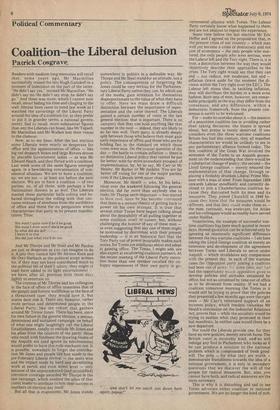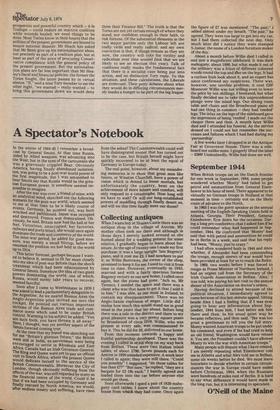Coalition the Liberal delusion
Patrick Cosgrave,
Readers with medium long memories will recall that, some years ago, Mr Macmillan successfully teased the late Hugh Gaitskell in a moment of indecision on the part of the latter. "He didn't say yes," intoned Mr Macmillan, He didn't say no/He didn't say stop, he didn't say go." And there was more, which I cannot now recall, about biding his time and clinging to the wall. Similar lines came to mind last week as I watched the cavortings of the Liberal Party around the idea of a coalition (or, as they prefer to put it in grander terms, a national government). Sad to recall, more substantial figures than any the Liberals can boast, like Mr Tapsell, Mr Macmillan and Mr Walker lent their voices to the clamour.
Now, as to my lines. After the last election some Liberals were nearly as desperate for office and the appurtenances of office — like big red despatch boxes and large Rovers driven by placable Government ladies — as was Mr Edward Heath, and they flirted with a coalition. Last week some of the same figures emerged again, in a bewildering concatenation of nonsensical allusions. We are to have a coalition; no, we are not — at least not before the next election. We are to have a coalition — of two parties; no, of all three, with perhaps a few Nationalists thrown in as well. The Liberals started these particular balls rolling and behaved throughout the rolling with that unctuous mixture of aloofness from the sordidities of office and thirst for its perquisites which characterises that party in its present manifestation. Thus: somewhere in politics in a definable way. Mr Thorpe and Mr Steel stand for an attitude, not a policy. The consequences of forgetting Mr Jones could be very serious for the Parliamentary Liberal Party unless they can, by adroit use of the media, gain attention for themselves disproportionate to the value of what they have to offer. Here we must draw a difficult distinction between the importance of representation and the value thereof. The Liberals gained a certain number of votes in the last general election: that is important. There is no certainty that they can hold anything like that number in the next — indeed, they are likely to do far less well. Their party is already deeply split between those who believe they must gain early experience of office, and those who are for holding fast to the standard on which those votes were won. On the crucial question of the day — the battle to contain inflation — there is no distinctive Liberal policy that cannot be put far better, with far more immediate prospect of implementation, by, let us say, Mr Carr or Mr Healey, Mr Barber or Mr Jenkins. You are far better off voting for one of the major parties, even if the Liberals seem nicer chaps.
Moreover, Mr Heath — who, by his behaviour over the weekend following the general election, did far more than anybody else to make Mr Thorpe seem important — has started to blow cool, since he has becorhe convinced that there is a serious chance of getting back to power on his own account. It is true that several other Tories have begun talking aloud about the desirability of all pulling together in some coalition overt or covert; but, without challenging the honour of any of these men — or even suggesting that any one of them might be motivated by discontent with their present leadership — it is an historical fact that the Tory Party out of power invariably makes such noises, for Tories are assiduous about and adept at gaining office. The Tories, I might add, are also expert at swallowing coalition partners. At the recent meeting of the Liberal Party executive more than one speaker recalled the unhappy experiences of their own party in go
vernmental alliance with Tories. The Labour Party certainly know what happened to them, and are not anxious to repeat the experience.
Some time before the last election Mr Eric Heffer and I agreed on the proposition that, in the present crisis of our country — which may well yet become a crisis of democracy and not just of economics — the only people who mat tered, the only people who were serious, were the Labour left and the Tory right. There is, it is true, a distinction between the way they would objectively describe their approaches to the crisis. The Tory right would say that they can end — not reduce, nor moderate, but end — inflation (leave aside for the moment the division within the Tory right over the EEC). The Labour left stress that, in tackling inflation, they will distribute the burden in a more even fashion, Both sets of men, however, are remarkable principally in the way they differ from the consensus; and any difference, within a democratic framework, from the present consensus is surely to be welcomed.
For — make no mistake about it — the essence of a peacetime coalition lies in avoiding rather than taking decisions: the blame is spread about, but praise is rarely deserved. If one considers even the three wartime coalitions Britain has had this century, they all manifest characteristics we would be unlikely to see in any parliamentary alliance formed today. The first coalition of the Great War involved the accession of the Tories to an Asquith government on the understanding that there would be a substantial change of policy; the second — the Lloyd George coalition — merely ensured the implementation of that change, through re placing a foolishly drunken Liberal Prime Minister with a man of steel. From September 1939 onwards Labour steadfastly and correctly declined to join a Chamberlainite coalition because they distrusted both its men and its .
measures. They joined Churchill in 1940 because they knew that the measures would be • different, and that they could make them so — the man, curiously, was irrelevant, for Attlee and his colleagues would as readily have served under Halifax.
Nonetheless, the example of successful wartime coalitions has been much quoted in recent days. Honest quotation can be achieved only by ignoring an immensely significant difference between the two wartime coalitions — 1 am here taking the Lloyd George coalition as merely an extension and development of the agreement between Tories and Liberals to serve under Asquith — which invalidates any comparision with the present day. In each of the wartime cases the Opposition party joining a coalition
had been out of power fer some time. and had had the opportunity winch opposition gives to develop policies and attitudes untainted by
office, but not so untainted by time out of office as to be divorced from reality. If we had a coalition tomorrow morning the Tories in it would still be trying to prove that the policies they presented a few months ago were the right ones — Mr Carr's reiterated support of an incomes policy, which renders valueless Mr Heath's concession on the Industrial Relations Act, proves that — while the socialists would be trying to sustain what they promised in their last manifesto. In neither case would there be a new departure.
Nor could the Liberals provide one, for they have no new policies, merely newish faces. The British voter is incurably kind, and so will indulge any fool in Parliament who looks as if he can produce a solution to the national problem which is compounded of fresh good will. The polls — for what they are worth — demonstrate friendliness towards the idea of a national government; it is only in secondary questions that we discover the will of the' people for radical measures. But, alas, you cannot have both, and radical measures are the more necessary.
This is why it is disturbing and sad to see Tories advocate either coalition or national government. We are no longer the kind of rich, prosperous and powerful country which — a la Trollope — could endure an inactive coalition while wounds healed; we need things to be done. Most Tories know in their hearts that the policies of the present government are bound to ensure national disaster. Mr Heath has asked that Mr Benn give up his nationalisation ideas, not precisely as part of a coalition plan, but at least as part of the price of procuring Conservative compliance with the general policy of the present government. But the nationalisation plans are far less important than Mr Healey's fiscal and financial policies: the former the Tories fought, the latter passed by in virtual silence. "If," said a wise Tory member to me the other night, "we wanted — really wanted — to bring this government down we would deny them their Finance Bill." The truth is that the Tories are not yet certain enough of where they stand, nor confident enough in their faith, to risk fortune. Of the substantial elements in the two major parties only the Labour left are really virile and really radical; and my own conviction is that, if things remain as they are now, the country will vote for virility and radicalism next time around (not that we are likely to see an election this year). Talk of coalitions really masks the fundamental fact that there is a socialist case being put into action, and no distinctive Tory reply. To this situation, and these calculations, the Liberals are irrelevant. Their petty debates about what they would do in differing circumstances merely masks a hunger to be part of the big league.



































 Previous page
Previous page